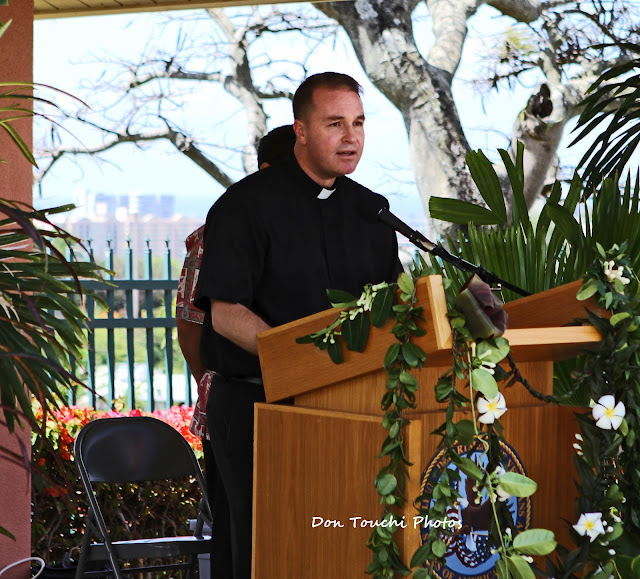Volunteering at nursing homes can be both rewarding and painful. I met Tiger about four years
ago when his wife entered the Pearl City Nursing Home. She had a stroke and is completely
immobilized, being unable to feed herself or take care of her bodily functions.
At first, Medicare was paying a good part of his wife's care. Medicare pays when there is a need
for acute care. This is when trained medical or nursing care is needed.
Jake entertains the patients. Mostly, he just lets them pet him. I had a talk with Tiger the other day
and asked how things were financially. He pays the entire cost of her care now, which is
$7,500 a month. This is just for custodial care. If she required nursing care, it would
be about $9,500 a month.
Theresa, a nurse's aid, used to sing professionally and helps quite a bit when I'm there.
Tiger is there every morning at 10 and stays with his wife until 10 at night. He
doesn't know if she knows that he's with her. But, he says, he knows.
Yvonne, also an aid, likes singing karaoke and she also helps in my show.
Tiger has run out of money and the reverse mortgage he took out on his home
doesn't provide enough for him to make his payments or, to support himself.
Another resident who has since passed away, couldn't afford the fees. The V.A. paid about
$4,000 a month which is barely half of what was required. Tiger, who is 88, will be in that position
if he ever requires nursing or custodial care since he has already annuitized his house
with a reverse mortgage.
Then, there's Ed, who kept asking for the song "Waikiki" and was so happy every week when I
sang it for him. When I finally got comfortable singing that song, he passed on.
Or, Gunny Sarge, who sat through an hour every week just to hear the song, "Your
Cheating Heart". Another one who passed. And "No Money, No Honey" who
just enjoyed music... even my hacking. Also passed.
It's not that the nursing homes are charging so much. It's the dollar that keeps
going down. This summer, the Feds have announced that they'll be printing
$42 Billion a month just to keep the economy from going into a deep dive.
When you flood the economy with cash, then the dollar becomes cheaper, making the
price of goods and services appear to go up. Our kupunas have nowhere to go.
















































